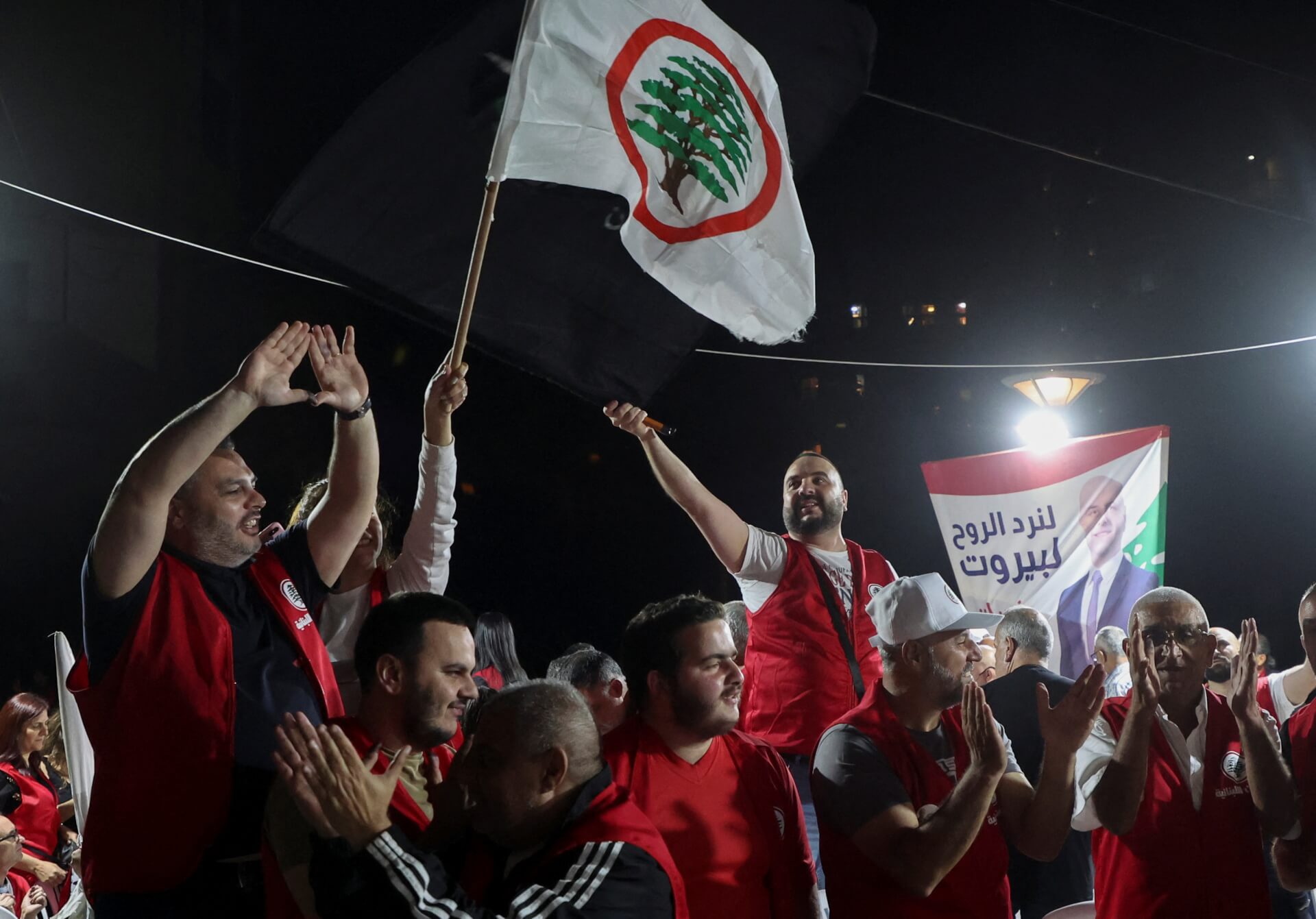Iran-backed militant group Hezbollah and its allies lost their parliamentary majority in the general election, final results released on Tuesday by the Interior Ministry showed.
While the results indicated that no single party was able to secure a majority, the final tally was a blow for Hezbollah and allied parties since they won only 61 seats, four short of a majority in the 128-member parliament. The alliance also won ten fewer seats than in the last election in 2018.
Lebanon, election results, seat count:
— Asia Elects (@AsiaElects) May 17, 2022
All seats declared:
LF (Conservative): 20
FPM (Conservative): 18
Amal (Conservative): 14
…
https://t.co/gDzLoQ5mBg
#Lebanon #Lebanonelections2022
#انتخابات_2022 #انتخابات_لبنان pic.twitter.com/u7DDZ9oScx
While all 13 Hezbollah candidates won, allied parties registered unexpected losses, including the defeat of veteran politician Talal Arslan of the Lebanese Democratic Party, who was unseated for the first time in 30 years. Moreover, President Michel Aoun’s Free Patriotic Movement (FPM), another Hezbollah ally, won only 18 seats, a drop of three seats from 2018.
Final minor revisions on this damned graph which is finally 100% accurate😅
— Nadim El Kak (@NadimElkak) May 17, 2022
Note: I counted Raji Saad (Mt Leb 4) as PSP ally but he could also count as LF. pic.twitter.com/M2jNuw4dgL
The biggest gainers of the election were the Lebanese Forces party, which won 21 seats, up from 15 in 2018, dethroning the FPM as the largest Christian party in the parliament. Lebanese Forces is one the most vocal opponents of Hezbollah and is led by former warlord Samir Geagea, who played a major role in the Lebanese civil war from 1975 to 1990.
Celebrations abound in Lebanon amid preliminary results in decisive parliamentary election https://t.co/QvxexQVoqI pic.twitter.com/RzfIZxVbMF
— The National (@TheNationalNews) May 16, 2022
The results also saw many newcomers and independent candidates gaining seats. 17 independents who participated in 2019 protests against the government's economic mismanagement and corruption won seats, with 12 of them newcomers. A record eight women candidates were also elected, nearly half of them newcomers.
🇱🇧🗳️I try to break down what the results of #LebanonElections2022 possibly mean for #Lebanon.
— Kareem Chehayeb | كريم شهيب (@chehayebk) May 18, 2022
It's still far too early to see how things will ultimately play out, but let's see. It's a critical time for the country. https://t.co/GVdBJy9Bok
While the election saw a dismal turnout of 41%, lower than the 50% registered in 2018, the 2022 election has been dubbed as a potential game-changer. Experts note that the Lebanese Forces could form an alliance with independent lawmakers as well as other MPs who oppose Hezbollah and emerge as the strongest alliance.
However, currently, the results have shown a fractured political environment that could worsen the country’s economic crisis and push it into further political instability.
🇱🇧🗳️ #LebanonElections2022: Hezbollah & allies lose majority in parliament.
— Kareem Chehayeb | كريم شهيب (@chehayebk) May 17, 2022
- Lebanese Forces now the largest Christian bloc, Free Patriotic Movement second.
- Major breakthrough of anti-establishment opposition activists
- Hariri boycott unsuccessful
In this respect, United Nations Secretary-General António Guterres called on the new parliament “to urgently adopt all legislation necessary to stabilise the economy and improve governance.” Guterres added that only the swift formation of a government can finalise a bailout deal with the International Monetary Fund (IMF) and allow the country to implement economic reforms.
“The UN continues to support Lebanon and its sovereignty, stability, and political independence in accordance with relevant Security Council resolutions,” he stressed.
Similarly, the United States welcomed the results and urged leaders to “recommit themselves to the hard work that lies ahead, to implement needed reforms to rescue the economy.” State Department spokesperson Ned Price said, We believe that part of that important work that lies ahead is government formation, a government that is responsible and responsive to the Lebanese people, that can undertake some of the reforms” that are necessary to alleviate the country’s economic hardships.
As #LebanonElection2022 frenzy comes to a close, reoccurring issues return to the forefront:
— Kareem Chehayeb | كريم شهيب (@chehayebk) May 18, 2022
💵 Lira drops in 6 days from 27,000↘️ 31,000 to the $
🛢️20L of petrol now 532,000LL + credit delay
🔌 No ⚡️ in Tripoli b/c Deir Ammar plant out of fuel
🍞 6 mills reportedly not operating
Saudi Ambassador Waleed Bukhari, meanwhile, took a swipe at Hezbollah without naming the group. “The results of the Lebanese parliamentary elections confirm the inevitability of giving priority to the logic of the state over the absurdity of the state’s surpluses that disrupt political life and stability in Lebanon,” he said.
People have blamed Hezbollah for causing the deadly 2020 Beirut port blast, which resulted in more than 200 deaths and about $15 billion in economic losses. Moreover, many citizens were angered after Hezbollah tried to hinder investigations into the blast and people have also protested against the militant group’s attempts at provoking a conflict with Israel by firing rockets.
Moreover, there was widespread anger in the country over the Shia group’s brutal crackdown on protests in 2019 against government economic policies and mismanagement.
Also Read: Despite Good Intentions, Lebanon’s Sectarian Politics Have Done More Harm Than Good
Since 2019, Lebanon has been mired in an economic crisis that has only grown worse with time. The World Bank has stated that the country’s economic crisis ranks as one of the worst that the world has witnessed in over 150 years. It reported that “Lebanon is enduring a severe and prolonged economic depression, which is among the most severe crisis episodes globally since the mid-nineteenth century.”
Moreover, the Lebanese pound has lost almost 90% of its value and three-quarters of its population is on the brink of poverty. The country is also facing severe food, medicine, and fuel shortages. The GDP growth rate has crashed by around 40%, unemployment levels have skyrocketed, and inflation has soared.

